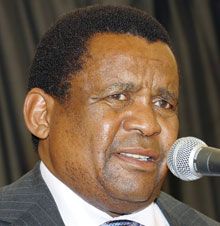DPP, Nchindo lawyers square up
GIDEON NKALA
Staff Writer
| Friday January 25, 2008 00:00


In the current sideshow, the Directorate of Public Prosecutions (DPP) has drawn first blood by demanding that Collins Newman Attorneys should recuse themselves from the case.
DPP argues that Collins and Newman suffers conflict of interest in the matter. 'We wish to put it on record that we are gravely concerned about issues of conflict of interest and ethics on your part,' said a letter from DPP citing a transaction that was carried out by Collins and Newman on behalf of Tourism Development Consortium and Golconda companies which are at the centre of the case.
The DPP letter cites a tax invoice for the work done and a deed of transfer that was carried out for some of the accused and that such transactions were part of some four amongst a total of 32 counts that the accused will face when the case resumes on January 31.
'Your law firm Collins, Newman and Company was at the material time, and still is, a legal advisor to Debswana Diamond Company. The aforementioned company is the complainant with regards to several counts as is clear from the indictment against your clients,' writes the DPP.
Not in so many words, the DPP's letter says they have instructed the Directorate on Corruption and Economic Crime (DCEC) to investigate the law firm's dealings in what they term 'clearly controversial acts' by Tourism Development Consortium.
'For the foregoing reasons, it is our view that your law firm's continued representation of the accused persons amounts, at the very least, to extreme conflict of interest and a clear disregard for legal ethics.
Further, on account of the foregoing, we wish to put you on notice that your law firm as an entity, and its officers (as individuals) are potential state witnesses in the matter at hand. The DCEC shall shortly approach you with regards to such matters. We reiterate that we are yet to decide if your law firm and its officers roles regarding this case will go beyond that of mere witnesses,' DPP ponders.
The DPP says, further, Collins and Newman lawyers drafted a TDC company, which resolution is a subject of dispute and as a consequence the company officers might be called upon to explain such issues.
'Should that situation transpire, your law firm will play the roles of state witness, defence witness and legal representatives,' DPP observes.
The DPP is of course saying this situation is untenable and should not be allowed and they are as such demanding that the Collins and Newman law firm should recuse itself from the case.
'We therefore urge your law firm as an entity, including its officers, to withdraw its services as legal representatives of the accused persons before the 31 January 2008 when the matter shall come before court,' asks the DPP.
According to the DPP, if Collins and Newman does not recuse itself from the case, it is likely that before the case, the trial magistrate would have to hear an application of recusal.
'Kindly take notice that failure to do so shall result in the prosecution seeking a court order compelling your law firm to withdraw from the case,' warns the DPP.
DPP' s efforts to get Collins and Newman lawyers to recuse themselves have been rebuffed.
Collins and Newman lawyers say they will not withdraw from the case as the prosecution desires.
In fact, the lawyers say they find the contents of the DPP letter surprising and disappointing.
'Not only is the invective in the letter defamatory and ill-considered, it exposes a lack of understanding of the attorney-client relationship and the privilege arising therefrom,' says Collins and Newman.
The lawyers proffered advice to the DPP on what they deem as ethical conduct that obtains in a rule of law dispensation.
'It is not appropriate for you to advise us whom we can or cannot represent, much in the same way as we cannot (and would not deign to) advise you whom you can or cannot prosecute. Accordingly, the contents of your letter are disgraceful and amount to an unlawful attempt to deny our clients their fundamental right in terms of the constitution to legal representation of their own choice.'
Collins and Newman takes a dim view of the DPP's suggestion that Debswana is a complainant in the matter that will come before court on January 31.
'If indeed Debswana is a complainant, it is for Debswana itself to raise any possible concerns about conflict of interest with us, and for us then to discuss any such concerns with it,' argues Collins and Newman. On the suggestion that officials of the law firm could potentially be state witnesses, the law firm finds this curious.
'As for the suggestion that Collins Newman or any of its officers might potentially be state witnesses, we can only say that this confirms our previous statements about the spurious nature of the charges. Neither your Directorate nor the DCEC has consulted with ourselves or taken statements from us. Nor can we even remotely see how any evidence Collins Newman or its officers might give could be remotely favourable to the state's case.
It is ultimately for our clients to decide whether we can properly and responsibly represent them, not for the state to try and compel us to leave our clients in the lurch.
We find your eagerness to get us to abandon our clients most distressing and troublesome. We shall accordingly not withdraw from representing our clients'.
The firm ended by reminding DPP that they would not respond any further to what they called 'unfounded assertions and allegations.'
